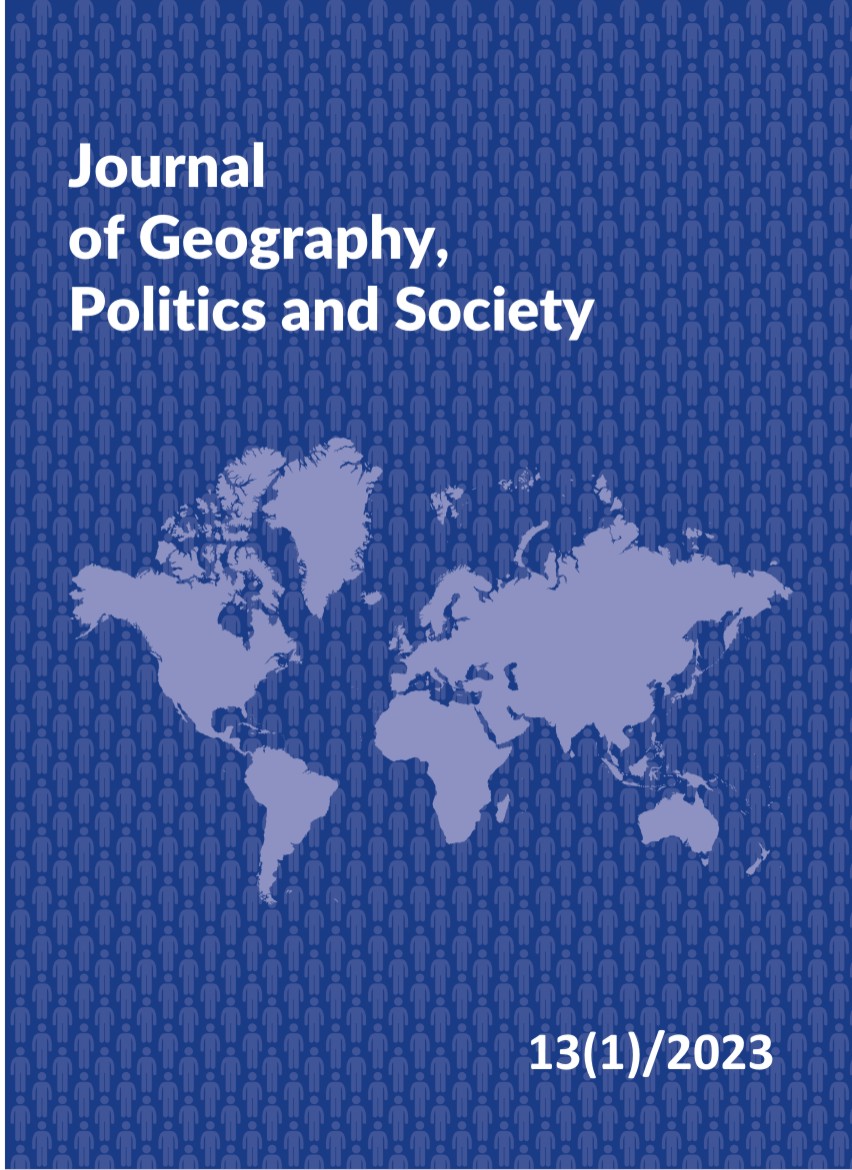Geographical and Mental Boundaries of Ukrainian Identity
DOI:
https://doi.org/10.26881/jpgs.2023.1.04Keywords:
mental boundaries, Ukrainian identity, ethnic identity, political identity, ethno-political identity, regional identityAbstract
The purpose of the research is to establish correspondence between the geographical and mental boundaries of the Ukrainian ethno-political identity. A theoretical and comparative analysis and generalization of historical, geographical, political and sociological theses and data have been applied. The research determines the external boundaries (between Ukraine and the surrounding countries) and internal ones (between the regions of Ukraine). It demonstrates the exceptional importance of the Ukrainian identity opposition to the Russian mental influences. Ukraine is divided into three main regions. Central Ukraine is a mental basis for the Ukrainian identity and political nation. Western Ukraine is notable for the highest level of national consciousness and Ukrainian patriotism. South-Eastern Ukraine is characterized by stronger competition of the Ukrainian and Russian values, but simultaneously by dominating Ukrainian identity.
Downloads
References
About number and composition population of UKRAINE by data All-Ukrainian population census’2001 data, http://2001.ukrcensus.gov.ua/eng/results/general/nationality/ (accessed 10 August 2022).
Balabanov K., Pashyna N., Lysak V., 2019, Regional Identity in Ukraine: Formation Factors and Functions, Studia Politica: Romanian Political Science Review, 19(3–4), 491–513.
Brentin D., 2014, “Now You See Who Is a Friend and Who an Enemy.” Sport as an Ethno-political Identity Tool in Postsocialist Croatia, Comparative Southeast European Studies, 62(2), 187–207. doi: 10.1515/soeu-2014-620208.
Cartrite B., 2002, Contemporary ethno-political identity and the future of the Belgian state, Nationalism and Ethnic Politics, 8(3), 43–71.doi: 10.1080/13537110208428669.
Chandra K., 2006, What is ethnic identity and does it matter?, Annual Review of Political Science, 9, 397–424. doi: 10.1146/annurev.polisci.9.062404.170715.
Chornyi S., 2001, Nacìonal’nij sklad naselennâ Ukraїni v XX storìččì. Dovìdnik (Eng. The ethnic composition of the population of Ukraine in the 20th century. Directory), Kartografìâ, Kyiv.
Clarke S.P., Cossette S., 2000, Secondary analysis: Theoretical, methodological and practical considerations, Canadian Journal of Nursing Research, 32(3), 109–129.
Collins R.N., Mandel D.R., Schywiola S.S., 2021, Political Identity Over Personal Impact: Early U.S. Reactions to the COVID-19 Pandemic, Frontiers in Psychology, 12, 607639. doi: 10.3389/fpsyg.2021.607639.
Epstein G.S., Heizler (Cohen) O., 2015, Ethnic identity: a theoretical framework, IZA Journal of Migration, 4, 9. doi: 10.1186/s40176-015-0033-z.
Fernandes D., Ordabayeva N., Han K., Jung J., Mittal V., 2022, How Political Identity Shapes Customer Satisfaction, Journal of Marketing, 86(6), 116–134. doi: 10.1177/00222429211057508.
Gamsakhurdia V., 2017, Quest for ethnic identity in the modern world—The Georgian case, Cogent Social Sciences, 3, 1309735. doi: 10.1080/23311886.2017.1309735.
Gentry B., 2018, Political Identity: Meaning, Measures, and Evidence, [in:] B. Gentry, Why Youth Vote, Springer, Cham, 19–48. doi: 10.1007/978-3-319-69608-9_2.
Goble P., 2016, Russian national identity and the Ukrainian crisis, Communist and Post-Communist Studies, 49(1), 37– 43. doi: 10.1016/j.postcomstud.2015.12.006.
Houkamau C, Milojev P., Greaves L., Dell K., Sibley Ch.G., Phinney J., 2021, Indigenous ethnic identity, in-group warmth, and psychological wellbeing: A longitudinal study of Māori, Current Psychology. First Online, doi: 10.1007/s12144-021-01636-4.
Johnston M.P., 2014, Secondary data analysis: a method of which the time has come, Qualitative and Quantitative Methods in Libraries, 3, 619–626.
Khan S.A., Byrne S., 2018, Cultural Politics Through the Eyes of Mohajir Women. The Dynamics of Mohajir Identity Conflict in Pakistan, Journal for Peace and Justice Studies, 28(2), 137–156. doi: 10.5840/peacejustice201828219.
Kočan F, Zupančič R., 2022, “Ethnicizing” the EU’s Involvement in Post-conflict Societies: The Case of Ontological Insecurity in Republika Srpska, Uluslararası İlişkiler / International Relations, 19(73), 113–127. doi: 10.33458/uidergisi.1094578.
Kuang L., Nishikawa S., 2021, Ethnic Socialization, Ethnic Identity, and Self-Esteem in Chinese Mulao Adolescents, Frontiers in Psychology, 12, 730478. doi: 10.3389/fpsyg.2021.730478.
Kulyk V., 2013, Language and Identity in post-Soviet Ukraine: Transformation of an Unbroken Bond, Australian and New Zealand Journal of European Studies, 5(2), 14–23.
Macapagal Ma.E.J., Montiel C.J., Canuday J.J.P., 2018, The Unifying and Divisive Effects of Social Identities: Religious and Ethno-political Identities Among Mindanao Muslims in the Philippines, Journal of Pacific Rim Psychology, 12, e28. doi: 10.1017/prp.2018.16.
Maehler D.B., 2022, Determinants of ethnic identity development in adulthood: A longitudinal study, British Journal of Developmental Psychology, 40, 46–72. doi: 10.1111/bjdp.12384.
Polese A., 2018, Building a Ukrainian Identity in Odessa: Negotiation of Markers and Informal Nationalism, Otoritas: Jurnal Ilmu Pemerintahan, 8(1), 1–16. doi: 10.26618/ojip.v8i1.1014.
The Tenth National Survey: Ideological Markers of the War (April 27, 2022), 2022, Rejting, https://ratinggroup.ua/en/ research/ukraine/desyatyy_obschenacionalnyy_opros_ ideologicheskie_markery_voyny_27_aprelya_2022.html (accessed 10 August 2022).
Vasiutynskyi V.O. (Ed.), 1997, Psihologìâ masovoї polìtičnoї svìdomostì ta povedìnki (Eng. Psychology of mass political consciousness and behaviour), DOK-K, Kyiv.
Vasiutynskyi V.O., 2012a, Socìal’na ìdentičnìst, predstavnikìv prosìjsko-movnoï spìl’nosti (Eng. Social identity of representatives of the Russian-speaking community), [in:] V.O. Vasiutynskyi (Ed.), Rosìjs’komovna spìl’nota v Ukraїnì: socìal’no-psihologìčnyj analìz (Eng. Russian-speaking community in Ukraine: social and psychological analysis), Imeks-LTD, Kirovograd, 170–178. https://ispp.org.ua/wpcontent/uploads/2020/04/monVasut-2012.pdf (accessed 10 August 2022).
Vasiutynskyi V.O., 2012b, Pozicìï predstavnikìv rosìjs’komovnoï spìlnoti ŝodo ukraïnìzacìï (Eng. The position of representatives of the Russian-speaking community about Ukrainization), [in:] V.O. Vasiutynskyi (Ed.), Rosìjs’komovna spìl’nota v Ukraїnì: socìal’no-psihologìčnyj analìz (Eng. Russian-speaking community in Ukraine: social and psychological analysis), Imeks-LTD, Kirovograd, 45–54. https://ispp.org.ua/wp-content/uploads/2020/04/monVasut-2012.pdf (accessed 10 August 2022).
Woo B., Fan W., Tran Th.V., Takeuchi D.T., 2019, The role of racial/ethnic identity in the association between racial discrimination and psychiatric disorders: A buffer or exacerbator? SSM – Population Health, 7, 100378. https://doi.org/10.1016/j.ssmph.2019.100378.

 Academic Scientific Journals
Academic Scientific Journals




